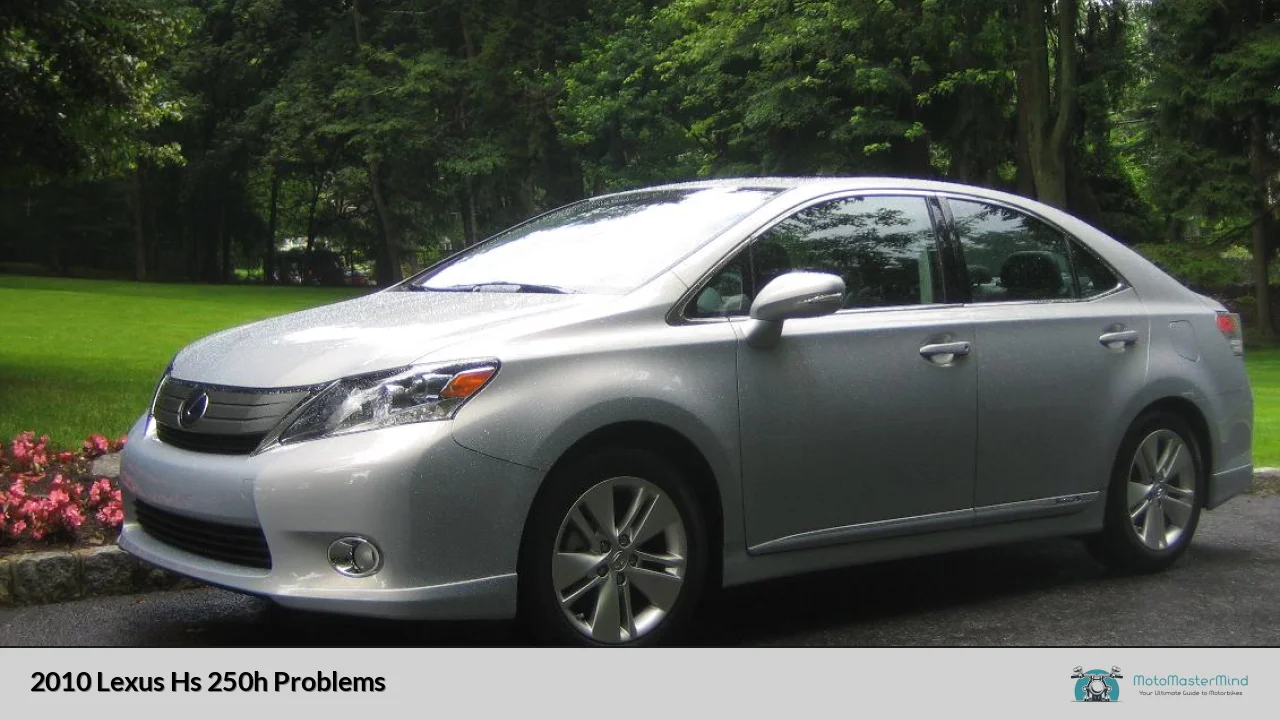Are you curious to know about the common issues associated with the 2010 Lexus HS 250h? Well, buckle up because we’re about to dive into the details! Owning a car can bring joy and convenience to your life, but it’s important to be aware of any potential problems that may arise.
One of the key concerns reported by owners of the 2010 Lexus HS 250h is related to its hybrid system. Some drivers have experienced issues with the hybrid battery failing prematurely or losing its charge capacity over time. This can result in reduced fuel efficiency and may require costly repairs or replacement.
Another problem that has been mentioned by HS 250h owners is related to the vehicle’s braking system. There have been reports of brake actuator failures, which can lead to a loss of braking power or an illuminated warning light on the dashboard. Needless to say, this poses a significant safety risk and should be addressed promptly.
In addition to the hybrid and braking system concerns, some owners have also noted problems with the vehicle’s transmission. Reports indicate that the continuously variable transmission (CVT) used in the HS 250h may experience issues such as shuddering, slipping, or delayed engagement. These problems can impact the overall driving experience and may necessitate repairs or even transmission replacement.
It’s worth noting that while these problems have been reported by some owners, not all vehicles will necessarily experience them. However, it’s crucial to stay informed and address any potential issues in a timely manner to ensure the longevity and performance of your Lexus HS 250h.
If you own a 2010 Lexus HS 250h and are experiencing any of these problems, it’s recommended to consult with a qualified mechanic or visit a Lexus dealership for diagnosis and repair. Remember, regular maintenance and attentive care can go a long way in preventing or mitigating these issues.
So, there you have it—some of the common problems associated with the 2010 Lexus HS 250h. Being aware of these issues empowers you as a car owner, allowing you to take proactive measures and make informed decisions. Stay tuned for more insightful automotive articles and keep enjoying your driving experience!
Investigating the 2010 Lexus HS 250h: Unraveling the Persistent Mechanical Issues

Are you in the market for a used hybrid vehicle? If so, it’s essential to do your research and fully understand the potential mechanical issues that may arise. One model that has garnered attention in this regard is the 2010 Lexus HS 250h. In this article, we’ll delve into the persistent mechanical issues associated with this particular vehicle.
One of the primary concerns surrounding the 2010 Lexus HS 250h is the vehicle’s brake system. Some owners have reported experiencing premature wear and deterioration of the brake pads and rotors. This issue can lead to reduced braking effectiveness, potentially compromising the safety of the driver and passengers. It’s crucial to thoroughly inspect the brake system and consider any necessary repairs or replacements if you’re considering purchasing this model.
Another mechanical problem commonly associated with the 2010 Lexus HS 250h revolves around the hybrid battery pack. Over time, owners have reported instances of decreased battery performance and even complete failure. Replacing the hybrid battery pack can be a costly endeavor, so it’s important to factor this potential expense into your decision-making process.
Furthermore, some owners have encountered issues with the transmission of the HS 250h. Reports suggest that the continuously variable transmission (CVT) may exhibit jerky shifting or fail altogether. As the transmission is a vital component of any vehicle, it’s crucial to have a qualified mechanic thoroughly inspect it before making a purchase.
In addition to these specific mechanical problems, it’s worth noting that the 2010 Lexus HS 250h has received mixed reviews regarding its overall reliability. While some owners have had positive experiences with the vehicle, others have faced multiple issues and frequent repairs. Considering this, it’s advisable to seek out a comprehensive vehicle history report and consult with a trusted mechanic before finalizing your decision.
The 2010 Lexus HS 250h has been plagued by persistent mechanical issues that potential buyers should be aware of. Problems with the brake system, hybrid battery pack, and transmission have been reported by owners. Additionally, the overall reliability of this model has been a subject of debate. To make an informed decision, it’s crucial to thoroughly inspect the vehicle, consult experts, and carefully weigh the potential risks associated with these mechanical problems.
Owners Speak Out: The Hidden Problems Plaguing the 2010 Lexus HS 250h
Introduction: When it comes to luxury hybrid vehicles, the 2010 Lexus HS 250h often stands out as a popular choice among car enthusiasts. However, beneath its sleek exterior and eco-friendly reputation lie a set of hidden problems that have left some owners frustrated and disappointed. In this article, we will delve into the issues voiced by owners themselves, shedding light on the less talked about aspects of the 2010 Lexus HS 250h.
Battery Performance Woes: One of the major concerns expressed by owners revolves around the performance of the vehicle’s hybrid battery. Some owners have reported experiencing reduced battery life over time, necessitating expensive replacements. This unexpected expense has not only proven inconvenient but has also raised questions about the long-term reliability of the vehicle.
Unresponsive Acceleration: Another problem plaguing the 2010 Lexus HS 250h is its unresponsive acceleration. While hybrid vehicles are generally known for their efficient power delivery, some owners have noticed a lag in the car’s response when attempting to accelerate quickly. This can be particularly frustrating during overtaking or merging situations, diminishing the overall driving experience.
Faulty Navigation System: The built-in navigation system in the 2010 Lexus HS 250h has also been a source of frustration for many owners. Reports indicate that the system may freeze, display incorrect information, or fail to provide up-to-date maps. These glitches not only compromise the convenience of navigating unfamiliar roads but can also lead to potentially dangerous situations.
Lackluster Interior Quality: Despite its luxury branding, the interior quality of the 2010 Lexus HS 250h has been a disappointment for some owners. Complaints center around cheap-feeling materials, uncomfortable seating, and limited rear legroom. Such issues detract from the overall comfort and premium experience that one would expect from a high-end vehicle.
Conclusion: While the 2010 Lexus HS 250h may seem like a dream come true for eco-conscious luxury car enthusiasts, it is essential to acknowledge the hidden problems reported by owners. Battery performance concerns, unresponsive acceleration, faulty navigation systems, and subpar interior quality have left some owners less than satisfied with their purchase. If you are considering purchasing a used 2010 Lexus HS 250h, be sure to thoroughly research these common issues and consult with experts to make an informed decision.
Recall Alert: Safety Concerns Surrounding the 2010 Lexus HS 250h
Are you aware of the potential safety concerns linked to the 2010 Lexus HS 250h? It’s important to stay informed about recalls that affect our vehicles, as they play a crucial role in ensuring our safety on the road. In this article, we’ll delve into the details surrounding the recall alert for the 2010 Lexus HS 250h and shed light on the safety issues associated with this particular model.
The 2010 Lexus HS 250h is part of a recall due to concerns regarding its hybrid system. Hybrid vehicles are designed to be environmentally friendly and fuel-efficient, but certain components can pose hazards if they malfunction. In the case of the HS 250h, the problem lies with the hybrid system’s transistors, which may overheat and potentially lead to a loss of power or even a fire within the vehicle.
Imagine cruising down the highway, enjoying a smooth ride, when suddenly your car loses power—quite a frightening scenario, isn’t it? That’s why it’s crucial to address this recall promptly. The safety of yourself and your passengers should always be a top priority.
To mitigate the risks associated with this issue, Lexus has taken action by initiating a recall campaign. Owners of affected vehicles are urged to bring their cars to authorized dealerships for an inspection and necessary repairs. During this process, the faulty transistors will be replaced with improved ones, ensuring the safe operation of the hybrid system.

If you own a 2010 Lexus HS 250h, don’t panic, but do take action. Contact your nearest Lexus dealership to schedule an appointment and have your vehicle checked for any potential issues. It’s better to be safe than sorry when it comes to matters of vehicle safety.
The 2010 Lexus HS 250h recall highlights safety concerns related to the hybrid system’s transistors. Taking prompt action by having your car inspected and repaired at an authorized dealership is of utmost importance. Remember, your safety and the safety of others on the road should never be compromised. Stay informed, stay safe, and drive with peace of mind knowing that your vehicle is in good condition.
Engineering Mishaps: Understanding the Troublesome Track Record of the 2010 Lexus HS 250h
Introduction:

When it comes to engineering achievements, we often marvel at the ingenuity and precision that goes into creating groundbreaking vehicles. However, there are instances where even the most esteemed automakers encounter mishaps along the way. One such example is the troubling track record of the 2010 Lexus HS 250h. In this article, we will delve into the details of the engineering flaws that plagued this particular model, shedding light on the challenges faced by Lexus.
The Infamous Brake Issues:
One of the primary concerns with the 2010 Lexus HS 250h lies in its brake system. Engineers initially designed a regenerative braking system intended to enhance fuel efficiency. However, the execution fell short, leading to a series of incidents where drivers experienced delayed responses or unexpected surges during braking. This flaw compromised both safety and peace of mind for those behind the wheel.
Unintended Acceleration:
Another critical problem that plagued the 2010 Lexus HS 250h was the issue of unintended acceleration. While this has been a recurring challenge for several automakers, it became a significant stumbling block for Lexus. Some drivers reported sudden and uncontrolled acceleration when attempting to slow down or stop the vehicle, posing severe risks on the road. This problem drew widespread attention and raised concerns about the overall reliability and quality of the model.
Recalls and Safety Measures:
As a response to the alarming number of incidents, Lexus took prompt action to address the engineering mishaps. The company issued recalls to rectify the brake and acceleration issues, striving to restore customer confidence and prioritize safety. These recalls involved fixing or replacing faulty components, implementing software updates, and enhancing the communication between the various systems within the car.
Lessons Learned:
The troubled track record of the 2010 Lexus HS 250h serves as a reminder of the complexities involved in engineering a reliable and safe vehicle. It highlights the importance of rigorous testing, meticulous quality control measures, and constant innovation to minimize the occurrence of such mishaps. By learning from these experiences, automakers can strive to improve their processes and deliver cars that meet the highest standards of performance, safety, and customer satisfaction.
Conclusion:

